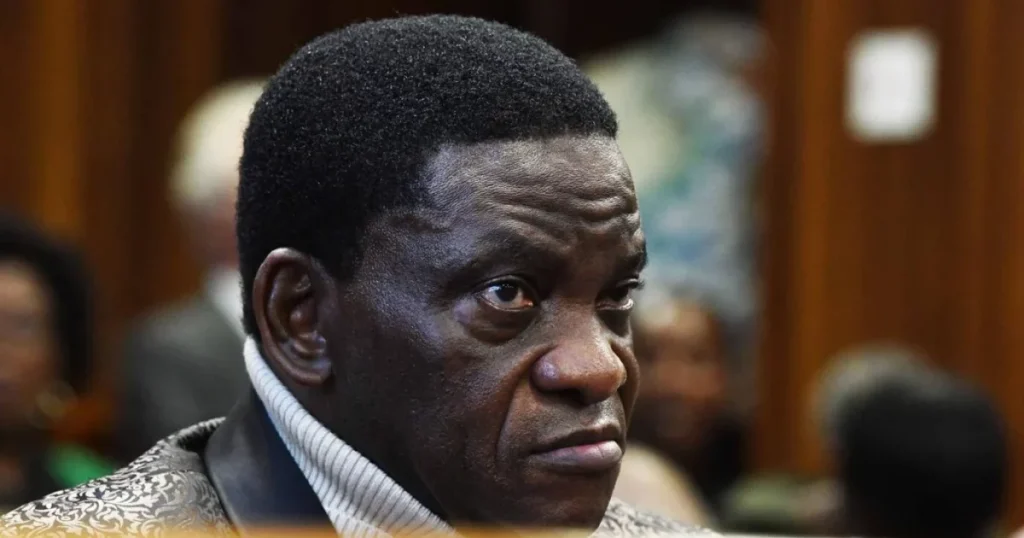The rearrest of Nigerian televangelist Timothy Omotoso in South Africa has reignited a complex legal saga that intertwines accusations of serious crimes with procedural missteps and public outcry. Omotoso, the Senior Pastor of Jesus Dominion International, was apprehended by the South African Police Service on Saturday, April 2025, just a month after his acquittal on charges of rape, human trafficking, and racketeering. This swift turn of events follows a controversial High Court ruling that dismissed the charges against Omotoso due to prosecutorial misconduct, sparking widespread condemnation and protests across South Africa. The new arrest, based on alleged immigration violations, adds another layer to this multifaceted case, raising questions about due process, the integrity of the legal system, and the ongoing struggle against gender-based violence in South Africa.
Omotoso’s initial arrest in 2017 marked the beginning of a protracted legal battle. He, along with his co-defendants Lusanda Sulani and Zukiswa Sitho, faced a multitude of charges related to sexual exploitation and trafficking. The case garnered significant public attention, particularly due to the vulnerability of the alleged victims and the prominent position of Omotoso as a religious leader. The trial unfolded over several years, marked by delays, procedural challenges, and intense media scrutiny. Ultimately, the Gqeberha High Court in Eastern Cape delivered a stunning verdict in April 2025, acquitting Omotoso and his co-defendants. Presiding Judge Irma Schoeman attributed the dismissal to errors and mishandling of evidence by the prosecution, effectively nullifying the years-long legal process.
The acquittal was met with immediate and widespread criticism. Many South Africans, along with various organizations and agencies, expressed outrage, viewing the outcome as a setback for the fight against gender-based violence. The perceived failure to hold Omotoso accountable sparked protests and reignited discussions about the effectiveness of the justice system in protecting vulnerable individuals, particularly women and girls, from sexual exploitation and abuse. The acquittal also raised concerns about the potential chilling effect on other victims of sexual crimes, potentially discouraging them from coming forward and seeking justice.
The subsequent arrest of Omotoso on immigration charges introduces a new dimension to the narrative. While the initial acquittal centered on procedural issues related to the prosecution’s conduct, the new charges shift the focus to Omotoso’s legal status within South Africa. According to reports, he was apprehended by the National Intervention Unit and the Tactical Response Team at a church in East London, where he was reportedly scheduled to preach. National Police Commissioner Fannie Masemola confirmed the arrest, stating that Omotoso would face charges related to violations of the Immigration Act. This development raises questions about the timing of the arrest and whether it represents a legitimate legal pursuit or a response to public pressure following the controversial acquittal.
The details of the immigration charges remain somewhat unclear. It is yet to be determined what specific violations Omotoso is accused of committing and the potential consequences he faces if found guilty. It is possible that the immigration charges could lead to his deportation from South Africa, even if he is ultimately found not guilty of the initial charges. The legal complexities surrounding the case are further amplified by the fact that Omotoso is a foreign national, potentially complicating extradition processes and jurisdictional issues. The case serves as a stark reminder of the challenges inherent in prosecuting international crimes, particularly those involving human trafficking and exploitation.
The ongoing saga surrounding Timothy Omotoso highlights the intricate intersection of legal procedure, public perception, and the struggle against gender-based violence in South Africa. The initial acquittal sparked widespread condemnation, viewed as a failure of the justice system to protect vulnerable individuals. The subsequent rearrest on immigration charges adds a new layer of complexity, raising questions about the motivations behind the arrest and the potential implications for Omotoso’s future. The case continues to draw significant public attention, underscoring the importance of a robust and accountable legal system that can effectively address complex crimes such as human trafficking and sexual exploitation while upholding the principles of due process and justice for all.


